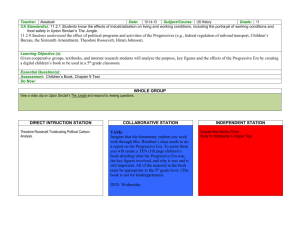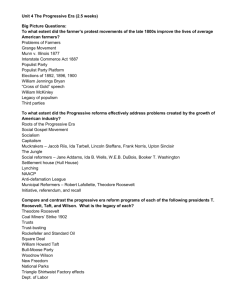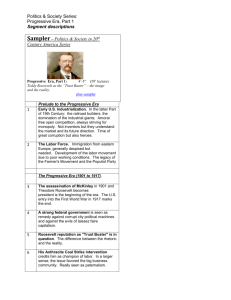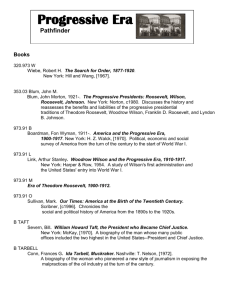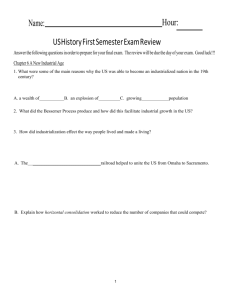Lesson #8: Progressivism III - North Clackamas School District
advertisement
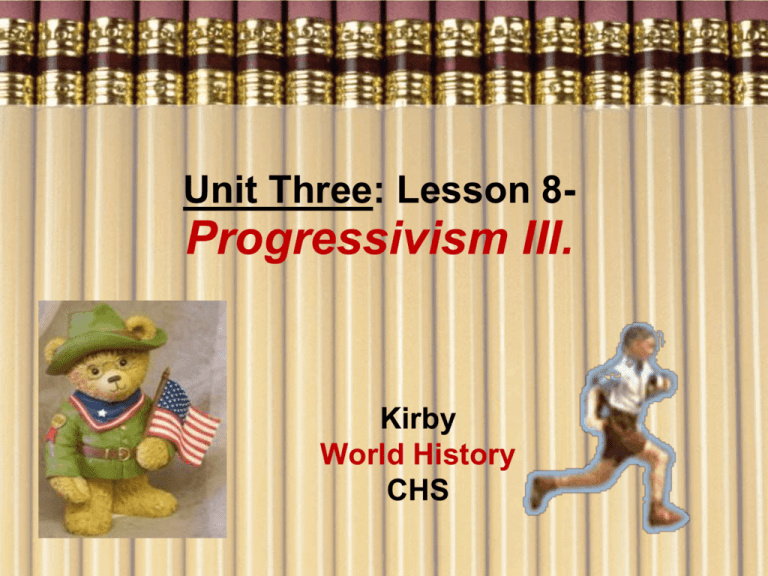
Unit Three: Lesson 8- Progressivism III. Kirby World History CHS UNIT LEARNING OBJECTIVES: North Clackamas School District Social Studies Priority Standards: HK 2. Analyze the complexity and investigate causes and effects of significant events in World History. TIMELINE TUESDAYS Put the following wars involving the United States in chronological order from earliest to most recent: a. World War I b. Korean War c. Revolutionary War d. World War II e. The Civil War f. The Vietnam War LESSON EIGHT : DAILY LEARNING TARGET I Can….Describe in writing Theodore Roosevelt’s “Square Deal” and Discuss and write about excerpts from: The Jungle USE THE CORNELL NOTE TEMPLATE FOR OF YOUR NOTES TODAY! Focus Up and…… Relax and enjoy the ride In History Class! Progressivism III. TEDDY ROOSEVELT’S SQUARE DEAL President William McKinley was assassinated 6 months into his second term. Theodore Roosevelt became the nations 26th president McKinley was assassinated by an anarchist in Buffalo in September of 1901 ROOSEVELT AND THE ROUGH RIDERS Roosevelt wanted war with Spain in 1898. His volunteer cavalry brigade, the Rough Riders, won public acclaim for its role in the battle at San Juan Hill in Cuba. Roosevelt returned a hero! Elected governor of NY and later McKinley’s vice Teddy Roosevelt and the Rough Riders THE MODERN PRESIDENT Roosevelt became the youngest president ever at age 42. He quickly established himself as a modern president. TRUSTBUSTING By 1900, Trusts – controlled 80% of U.S. industries . Roosevelt filed 44 antitrust suits under the Sherman Antitrust Act. 1902 COAL STRIKE In 1902 coal miners in Pennsylvania went on strike for increased wages, a 9-hour work day, and the right to unionize. Mine owners refused to bargain. Roosevelt called in both sides and settled the dispute. Thereafter, when a strike threatened public welfare, the federal government was expected to step in and help. “THE JUNGLE” LEADS TO FOOD REGULATION After reading The Jungle by Upton Sinclair, Roosevelt pushed for passage of the Meat Inspection Act of 1906. The Act mandated cleaner conditions for meatpacking plants. PURE FOOD AND DRUG ACT In response unhealthy products, Congress passed the Pure Food and Drug Act in 1906. The Act halted the sale of contaminated foods and medicines and called for truth in labeling. The Pure Food and Drug Act took medicines with cocaine and other harmful ingredients off the market ROOSEVELT AND THE ENVIRONMENT Before Roosevelt’s presidency, the federal government paid very little attention to the nation’s natural resources. Roosevelt made conservation a Roosevelt, left, was an avid primary concern of his outdoorsman – here he is with author John Muir at Yosemite Park administration. ROOSEVELT’S ENVIROMENTAL ACCOMPLISHMENTS Roosevelt set aside 148 million acres of forest reserves. He also set aside 1.5 million acres of water-power sites and he established 50 wildlife sanctuaries and several national parks. Yellowstone National Park, Wyoming ROOSEVELT AND CIVIL RIGHTS Roosevelt failed to support Civil Rights for African Americans. He did, however, support a few individuals such as Booker T. Washington. NAACP FORMED TO PROMOTE RIGHTS In 1909 The NAACP was formed. It had 6,000 members by 1914. The goal of the organization was full equality among the races. The means to achieve this was the court system. 1964 Application PROGRESSIVISM UNDER PRESIDENT TAFT Republican William Howard Taft easily defeated Democrat William Jennings Bryan to win the 1908 presidential election. Among his accomplishments, Taft “busted” 90 trusts during his 4 years in office. Taft, right, was Roosevelt’s War Secretary TAFT LOSES POWER Taft called the Presidency, “The Most lonesome job in the world” Taft was not popular with the American public nor reform minded Republicans. 1912 ELECTION Republicans split in 1912 between Taft and Teddy Roosevelt (who returned after a long trip to Africa). The Democrats put forward a reform minded New Jersey Governor, Woodrow Wilson. Republicans split in 1912 WILSON’S NEW FREEDOM As America’s newly elected president, Wilson moved to enact his program, the “New Freedom.” He planned his attack on what he called the triple wall of privilege: trusts, tariffs, and high finance. W. Wilson U.S. President 1912-1920 CLAYTON ANTITRUST ACT In 1914 Congress enacted the Clayton Antitrust Act which strengthened the Sherman Act. The Act also supported workers unions. FEDERAL TRADE COMMISSION FORMED Today the FTC has been working on protecting consumers from ID theft The FTC was formed in 1914 to serve as a “watchdog” agency to end unfair business practices FEDERAL INCOME TAX ARRIVES Ratified in 1916, the 16th Amendment legalized a graduated federal income tax. WOMEN WIN SUFFRAGE Native-born, educated, middle-class women grew more and more impatient. Through local, state and national organization, vigorous protests and World War I, women The 19th Amendment gave finally realized their women the right to vote in dream in 1920. 1920 LIMITS OF PROGRESSIVISM While the Progressive era was responsible for many important reforms, it failed to make gains for African Americans. Like Roosevelt and Taft, Wilson retreated on Civil Rights once in office. The KKK reached a membership of 4.5 million in the 1920s SUMMARY PARAGRAPH: Explain three positive Things that came from the progressive era. Explain something negative also. The KKK reached a membership of 4.5 million in the 1920s PRACTICE: THE JUNGLE LEADS TO FOOD REGULATION After reading The Jungle by Upton Sinclair, Roosevelt pushed for passage of the Meat Inspection Act of 1906 Read The Jungle Packet today which contains excerpts from the book. Answer the questions with a partner. Please turn directly into me. Work on your DBQ packet (Due This Thursday) or your “Women’s Suffrage Postage Stamp” (Due Today) DBQ DISCUSSION TODAY: “PROGRESSIVE ERA” We will begin the DBQ small group discussion in 15 minutes. Take out your packet now Make sure you attach/staple a PINK scoring guide to the back of your packet before we start. The scoring guide is for: a. The written analysis b. The discussion I will assign you a group shortly DBQ DISCUSSION TODAY: “PROGRESSIVE ERA” Discussion Focus Question: How progressive was the Progressive Era? Consider economic, social, and political Accomplishments. DBQ DISCUSSION TODAY: “PROGRESSIVE ERA” Round #1: What were the Economic Accomplishments of the Progressive Era? Give two examples from your packet: At the sound of the bell….. Come Out Talking! DBQ DISCUSSION TODAY: “PROGRESSIVE ERA” Round #2: What were the Economic Problems of the Progressive Era? Give two examples from your packet: At the sound of the bell….. Come Out Talking! DBQ DISCUSSION TODAY: “PROGRESSIVE ERA” Round #3: What were the Social Accomplishments of the Progressive Era? Give two examples from your packet: At the sound of the bell….. Come Out Talking! DBQ DISCUSSION TODAY: “PROGRESSIVE ERA” Round #4: What were the Social Problems of the Progressive Era? Give two examples from your packet: At the sound of the bell….. Come Out Talking! DBQ DISCUSSION TODAY: “PROGRESSIVE ERA” Round #5: What were the Political Accomplishments of the Progressive Era? Give two examples from your packet: At the sound of the bell….. Come Out Talking! DBQ DISCUSSION TODAY: “PROGRESSIVE ERA” Round #6: What were the Political Problems of the Progressive Era? Give two examples from your packet: At the sound of the bell….. Come Out Talking! “THE WORKINGS OF A POLITICAL MACHINE” GROUP READ ALOUD: DIRECTIONS PARTNER UP (OR NOT) READ DIARY ENTRIES ANSWER QUESTIONS BASED ON THE DIARY ENTRIES COMPLETE PART II. POLITICAL MACHINES
